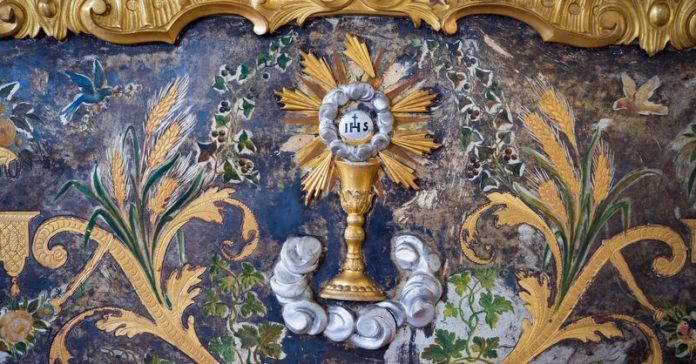
Learn the meaning of the Latin phrase Ite, missa est
SUSIE LLOYD
Did you ever wonder where the word Mass comes from? The answer has been staring you in the face all along:
Priest: Go forth; the Mass is ended.
People: Thanks be to God.
Still not getting it? That could be because you’ve been hearing the words all wrong. No offense — so did I, until my pastor explained it to me. On the surface these words seem to be saying:
Priest: Time to go.
People: Thank God. I’m getting hungry.
This interpretation makes it seem like we are all done. Like we punched in, put in our required time, and now we can punch out.
But it is just the opposite!
Let’s backtrack a bit. When the priest says, “The Mass is ended,” he is not saying that it is over the way, say, a movie is over. Cut. The end. Roll the credits. He is saying that the sacrifice is complete, just as Jesus on the cross said, “It is consummated.” We have offered that very same sacrifice to the Father. Not only that, but we have consumed Our Lord in Holy Communion. He is with us, in us, intimately. Now it is time for us to carry him forth with us into the world.
All of that is wrapped up in that one little word Mass. It comes from the original Latin
dismissal:
Priest: Ite, missa est.
People: Deo gratias.
Stay with me here. This could get boring — unless you are a word nerd like me. The word Mass comes from “missa.” Where does the word missa come from? It comes from mittere, which means “to send.” Other words like message, missive, and missile also come from this word. They are all things that get sent.
Perhaps you are thinking, Okay, so … what is getting sent at the end of Mass?
We are!
Ta-da!
In case you doubt the word nerd, I can prove it. Here are the other options a priest may use at the conclusion of Mass:
“Go and announce the Gospel of the Lord.” “Go in peace, glorifying the Lord by your life.”
These responses clearly show that we are being sent on a mission. (Yup, mission comes from mittere, too.)
Pope Emeritus Benedict said that we need “to make this connection clear.” He wrote about it in his book on the Eucharist, Sacramentum Caritatis (The Sacrament of Charity).
These few words succinctly express the missionary nature of the Church. The People of God might be helped to understand more clearly this essential dimension of the Church’s life, taking the dismissal as a starting-point.
Starting point. Exactly. That is why we call it Mass. Mass means “you have been sent.”
Your shift is not over. It is just beginning!
So the next time you rush out of Mass, let it be with a sense of mission and not just to race everybody else out of the parking lot.
God has given you so much. And he wants you to share it with others. Whatever you do on
Sunday after Mass and for the rest of the week, ask him to show you how to be his missionary. How can people see his smile? Through your smile. How can they hear his words? Through your words. How can they feel his touch? Through your loving actions. Ite, missa est. Go forth, you have been sent. Deo gratias. Thanks be to God.
Susie Lloyd has won three Catholic Press Awards for her writing. Find her books, articles, and speaking schedule at SusieLloyd.com.
This article was originally published in Catechist magazine, November 2018
PHOTO: ISAAC74/ISTOCK




